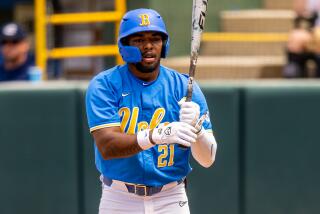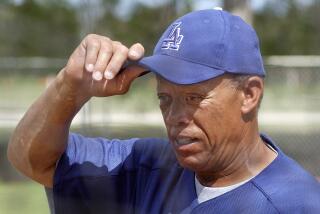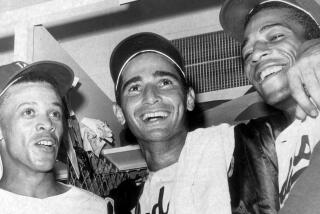BYU’s Contact Hitter : Mike Willes Isn’t Trying to Hit Home Runs; He Just Can’t Seem to Keep the Ball in the Park
- Share via
To watch Mike Willes take batting practice, you wouldn’t guess that he has hit more home runs in the past two seasons than any other college baseball player in the country.
While other players hit towering drives with the aluminum bats they use in games, Willes steps to the plate with a wooden bat, the better to test the nuances of his skill.
The drives off his wooden bat before games can’t match those off the aluminum bats of others. But in games, using the aluminum bat, Willies has succeeded as few others have. Last season, as a junior at Brigham Young, he led the nation in home runs with 31. In 48 games this season, he is in first place again, this time with 34. BYU is 35-13-1.
The wooden bat, Willes says, is more demanding--less powerful and less forgiving of small mistakes. And it is more apt to show the world when a hitter misses the sweet spot, however slightly.
For Willes, who played baseball and football at Fullerton High School, the wooden bat offers an opportunity to fine-tune his hitting before a game. “Mostly,” he says, “it helps me concentrate better.”
Willes doesn’t give himself away with a trademark home-run trot, either. As often as he has taken that route, he still runs as if it might be his first.
“You know, to be honest, I don’t think I have a home-run trot,” he said. “One time I hit one pretty well and watched it go out, took a couple of steps and then jogged around slowly. It didn’t feel good. It felt unusual. I like to run them out just like I hit a single, then slow down just a little once it clears.”
His tremendous success makes it a bit hard to understand why BYU Coach Gary Pullins says that Willes isn’t really a home-run hitter.
“It sounds crazy to say,” Pullins said, “but Mike is a contact hitter.”
Perhaps. But it’s powerful contact.
In 176 at-bats this season, Willies has 75 hits--34 of them home runs. Which is to say that he hits a home run almost every fifth time he steps to the plate. And that almost half his hits are homers. He also has 9 doubles.
Which works out to a slugging percentage of 1.057. But Pullins still declines to call Willes a home-run hitter, in part because the term is usually applied to a batter who frequently strikes out or hits long fly balls as he looks for a pitch to belt over the fence.
Willes doesn’t fit the mold.
He has a .426 average and 94 runs batted in and has struck out only 13 times. He also has walked 45 times.
“His batting average is a better barometer of his hitting than his home runs,” Pullins said. “It never varies. He might have one bad at-bat in a game, but he won’t have a bad game. He’s not swinging at bad balls. He makes contact. He’s just one of those guys--Mr. Steady.”
Another likely reason that Pullins and Willes downplay the image of home-run hitter is that they want to avoid the image of a one-dimensional player. It is an image that apparently hurt Willes last year, when he was passed over in the professional draft.
Scouts apparently were concerned about Willes’ defensive abilities and were skeptical of his hitting power because he plays in a notorious hitters’ park. BYU’s field is just 345 feet down the lines and is at an elevation of 4,500 feet.
What’s more, he isn’t fast enough for most infield positions, and not big enough (5-feet 10-inches, 175 pounds) to play first base. His arm isn’t quite good enough for him to play the outfield.
Willes’ bat is so good, of course, that Brigham Young finds a place for him. He splits his time playing designated hitter, backup catcher and backup third baseman. And he waits for the June draft, to see if he fares better this year.
“I’m sure he’ll be drafted by someone, not in the first rounds, maybe not in the first 10,” Pullins said. “But all he’ll do once he gets there is help people win. If he gets the opportunity to show his hard work and determination, he’ll be successful on that level, too.”
In the meantime, Willes keeps swinging the bat, and he and his coach keep insisting that no, he really isn’t a home-run hitter.
“This might sound funny, but I never have thought of myself as a home-run hitter,” Willes said. “I’d rather consider myself a line-drive type or alleys hitter. You get some good contact, hit for average, and occasionally the ball gets up and goes out of the yard. My goal is to hit the ball hard. Then whatever happens, if it’s right at the left fielder, I’m satisfied. It’s all right, too, if it goes out of the park.”
Yes, that would be all right.
More to Read
Go beyond the scoreboard
Get the latest on L.A.'s teams in the daily Sports Report newsletter.
You may occasionally receive promotional content from the Los Angeles Times.










